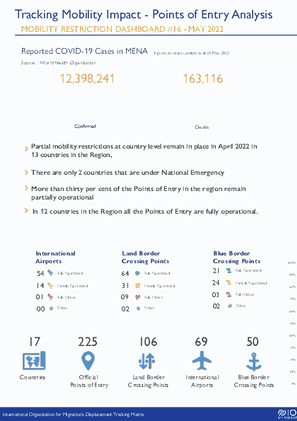-
Countries
-
Data and Analysis
-
Special Focus
-
Crisis Responses
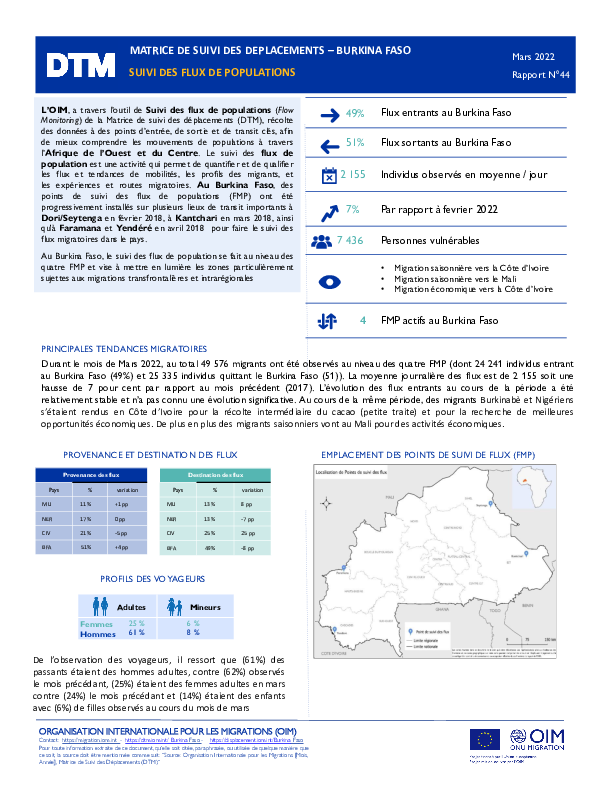
Contact
DTM Burkina Faso, DTMBurkinaFaso@iom.int
Language
French
Location
Burkina Faso
Period Covered
Mar 01 2022
Mar 31 2022
Activity
- Flow Monitoring
L’OIM, a travers l’outil de Suivi des flux de populations (Flow Monitoring) de la Matrice de suivi des déplacements (DTM), récolte des données à des points d’entrée, de sortie et de transit clés, afin de mieux comprendre les mouvements de populations à travers l’Afrique de l’Ouest et du Centre. Le suivi des flux de population est une activité qui permet de quantifier et de qualifier les flux et tendances de mobilités, les profils des migrants, et les expériences et routes migratoires. Au Burkina Faso, des points de suivi des flux de populations (FMP) ont été progressivement installés sur plusieurs lieux de transit importants à Dori/Seytenga en février 2018, à Kantchari en mars 2018, ainsi qu'à Faramana et Yendéré en avril 2018 pour faire le suivi des flux migratoires dans le pays.
Au Burkina Faso, le suivi des flux de population se fait au niveau des quatre FMP et vise à mettre en lumière les zones particulièrement sujettes aux migrations transfrontalières et intrarégionales.
Ce rapport présente les données recueillies aux FMP du Burkina Faso en mars 2022.
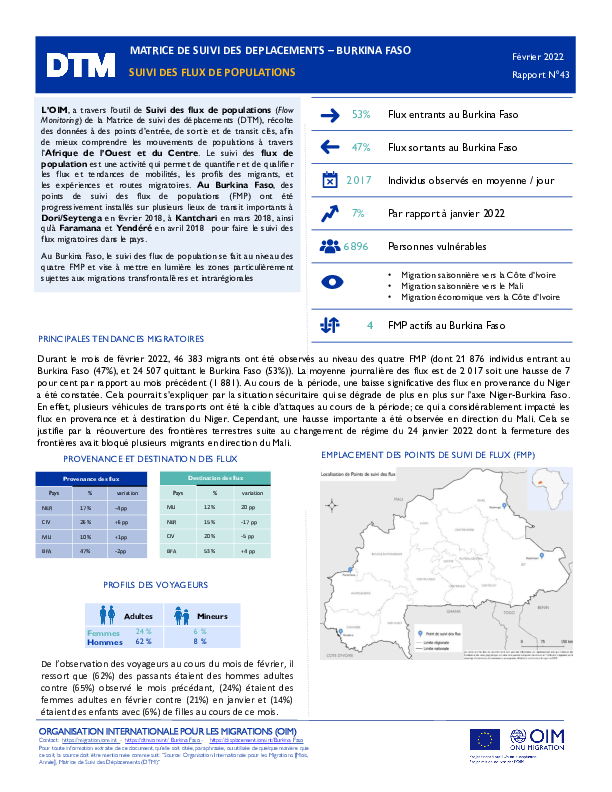
Contact
DTM Burkina Faso, DTMBurkinaFaso@iom.int
Language
French
Location
Burkina Faso
Period Covered
Feb 01 2022
Feb 28 2022
Activity
- Flow Monitoring
L’OIM, a travers l’outil de Suivi des flux de populations (Flow Monitoring) de la Matrice de suivi des déplacements (DTM), récolte des données à des points d’entrée, de sortie et de transit clés, afin de mieux comprendre les mouvements de populations à travers l’Afrique de l’Ouest et du Centre. Le suivi des flux de population est une activité qui permet de quantifier et de qualifier les flux et tendances de mobilités, les profils des migrants, et les expériences et routes migratoires. Au Burkina Faso, des points de suivi des flux de populations (FMP) ont été progressivement installés sur plusieurs lieux de transit importants à Dori/Seytenga en février 2018, à Kantchari en mars 2018, ainsi qu'à Faramana et Yendéré en avril 2018 pour faire le suivi des flux migratoires dans le pays.
Au Burkina Faso, le suivi des flux de population se fait au niveau des quatre FMP et vise à mettre en lumière les zones particulièrement sujettes aux migrations transfrontalières et intrarégionales.
Ce rapport présente les données recueillies aux FMP du Burkina Faso en février 2022.

Contact
DTM Colombia, dtmcolombia@iom.int
Language
Spanish
Location
Colombia
Period Covered
Oct 07 2021
Nov 18 2021
Activity
- Survey
- Flow Monitoring
- Mobility Tracking
Según los últimos datos de Migración Colombia, a corte del 31 de agosto de 2021, al menos 264.148 refugiados y migrantes venezolanos residen en el departamento de Antioquia, lo que lo posiciona como el segundo departamento de Colombia con mayor número de migrantes. Con el fin de obtener datos actualizados y con mayor nivel de detalle requeridos para la elaboración de la política pública de la ciudad, en octubre de 2021, La Organización Internacional para las Migraciones(OIM) Colombia despliega la Matriz de Seguimiento de Desplazamiento (DTM) para personas refugiadas y migrantes con vocación de permanencia en Medellín, priorizando las comunas: Popular; Santa Cruz; Manrique; Aranjuez; Castilla; Doce de Octubre; Robledo; Villa Hermosa; Buenos Aires; La Candelaria; Laureles – Estadio; La América, San Javier; Belén y los corregimientos de San Cristóbal, Altavista, San Antonio de Prado y Santa Elena. Los resultados de esta actividad de recolección de información, se presentan en este informe compuesto por 10 apartados, que le permitirán a los distintos actores y sectores de respuesta tener una mayor comprensión del fenómeno migratorio presente en la ciudad.

Contact
DTM Nigeria, AllUsersInDTMNigeria@iom.int
Language
English
Location
Nigeria
Period Covered
May 30 2022
Jun 05 2022
Activity
- Mobility Tracking
- Event Tracking
Nigeria's north-central and north-west zones are afflicted with a multidimensional crisis rooted in long-standing tensions between ethnic and religious groups and involves attacks by criminal groups and banditry/hirabah (such as kidnapping and grand larceny along major highways). During the past years, the crisis has accelerated because of the intensification of attacks and has resulted in widespread displacement across the region.
Between the 30th of May and 5th of June 2022, armed clashes and banditry have led to new waves of population displacement. Following these events, rapid assessments were conducted by DTM (Displacement Tracking Matrix) field staff to inform the humanitarian community and government partners, and enable targeted response. Flash reports utilise direct observation and a broad network of key informants to gather representative data and collect information on the number, profile and immediate needs of affected populations.
During the assessment period, the DTM identified an estimated 3,452 individuals who were affected by the attacks. In the LGA Sabuwa in the state of Katsina, 50 individuals were displaced in the ward Sayau. In the LGAs Gusau, Bukkuyum and Bungudu in the state of Zamfara, a total of 921 individuals were forced to flee to neighbouring wards. Additionally, in the LGA Kajuru of Kaduna State, 2,424 individuals were displaced in the wards Idon and Maro. A total of 112 casualties were reported, including 55 injuries and 57 fatalities.
Contact
DTMUkraine@iom.int
Location
Ukraine
Activity
- Mobility Tracking
- Baseline Assessment
Period Covered
May 16 2022 -May 31 2022
A baseline assessment is a sub-component of mobility tracking. It aims to collect data on IDP, migrant or returnee population presence in a defined administrative area of the country.
Population Groups
Survey Methodology
Unit of Analysis Or Observation
Type of Survey or Assessment
Keywords
Geographical Scope
Administrative boundaries with available data
The current dataset covers the following administrative boundaries
This Middle East and North Africa (MENA) report summarizes mobility restrictions at airports, land, and blue border crossing points resulting from the mitigation measures implemented in response to the COVID-19 pandemic.
Contact
DTM Yemen, iomyemendtm@iom.int
Location
Yemen
Activity
- Flow Monitoring
Period Covered
May 01 2022 -May 31 2022
In May 2022, IOM Yemen DTM recorded 3,228 migrants entering Yemen, similar to 5,212 in April 2022. The decrease migration flow, in comparison to previous months, is likely related to seasonal changes including difficult weather conditions and high tides. Furthermore, the drop might also be associated with the tightening of security measures on the borders of Djibouti and Yemen.
Due to the deteriorating humanitarian crisis in Yemen and the challenges in moving towards KSA, many migrants opted to return to the Horn of Africa. DTM teams in Djibouti recorded that during May 2022, a total of 496 migrants (489 Ethiopian and 7 Somali nationals) took the risky return by boat from Yemen to travel home. Moreover, DTM recorded 5,440 Yemeni returns from KSA during the month of May 2022, compared to 5,898 in April 2022.
Between 1 January and 31 May 2022, DTM recorded 28,092 migrants and 29,390 Yemeni migrant returnees to Yemen.
The migrant caseload was around 75 per cent Ethiopian nationals, and around 25 per cent Somali nationals. The migrants are predominantly male (67%), with (22%) women, six per cent boys and five per cent girls also among the travelers.
Through May’s reporting period, 1,256 migrants arrived from Somalia and were recorded 1,210 at Ber Ali and 46 at Eyn Bamabad flow monitoring points in Shabwah governorate. In Lahj governorate, 1,972 migrants arrived from Djibouti, wherein 731 were recorded at Al Makhabah flow monitoring point (FMP), 576 at Al Karoob FMP, 455 at Al Azaf FMP, 210 at Al Cawhah FMP.
Population Groups
Survey Methodology
Unit of Analysis Or Observation
Type of Survey or Assessment
Keywords
Geographical Scope
Administrative boundaries with available data
The current dataset covers the following administrative boundaries
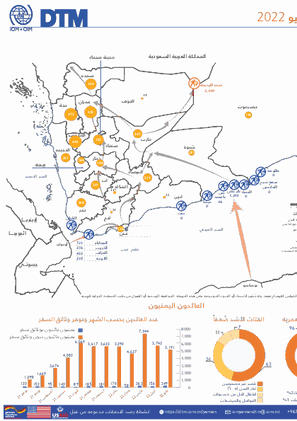
Contact
DTM Yemen, iomyemendtm@iom.int
Language
English
Location
Yemen
Period Covered
May 01 2022
May 31 2022
Activity
- Flow Monitoring
في مايو 2022 ، سجلت مصفوفة تتبع النزوح (DTM) التابعة للمنظمة الدولية للهجرة في اليمن 3,228 مهاجرًا دخلوا اليمن ، مقارنة بـ 5,212 مهاجرًا في ابريل 2022. من المرجح ان الانخفاض في عدد المهاجرين الواصلين مقارنة بالشهور السابقة يعود الى تغيرات احوال الطقس والمد والجزر بالاضافة الى زيادة الإجراءات الأمنية على سواحل اليمن وجيبوتي.
بسبب الأزمة الإنسانية المتدهورة في اليمن والتحديات في المضي قدمًا نحو المملكة العربية السعودية ، اختار العديد من المهاجرين العودة إلى القرن الأفريقي. حيث سجلت فرق مصفوفة تتبع النزوح في جيبوتي خلال مايو 2022 ، خوض 496 مهاجراً رحلة العودة الخطرة على متن قوارب من اليمن. بالإضافة إلى ذلك ، سجلت مصفوفة تتبع النزوح في اليمن حوالي 5,440 يمني عادوا من المملكة العربية السعودية خلال شهر مايو، مقارنة بـ 5,898 في ابريل 2022. خلال الفترة بين 1 يناير و 31 مايو 2022، وصل ما يقدر بـ 28,092 مهاجرًا و 29,390 يمنيًا عائداً إلى اليمن.
حيث مثل عدد المهاجرين من إثيوبيا75 % في المائة و 15 في المائة من الصوماليين. كانت غالبية المهاجرين من الذكور (67%) مع (22%) من النساء ، و ستة في المائة من الأولاد و خمسة في المائة من الفتيات اللواتي كنا ايضاً من ضمن المسافرين.
خلال فترة التقرير في مايو 2022، شوهد وصول 1,256 مهاجرا من الصومال وتم تسجيل 1,210 في نقطة مراقبة التدفق في بئر علي و 46 في نقطة عين بامعبد في محافظة شبوة. بينما شهدت نقاط مراقبة التدفق بمديرية المضاربة والعارة بمحافظة لحج وصول عدد 1,972 مهاجرا وصلوا من جيبوتي , حيث تم تسجيل 731 في المخاباه ؛ وا 576 في الكروب ؛وا 455 في العزاف ؛وا 210 في الكوحه.
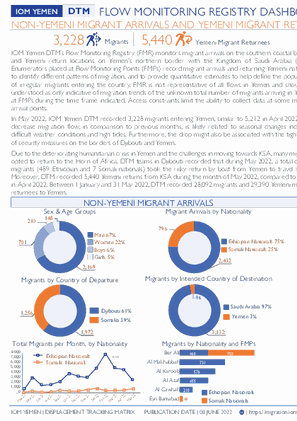
Contact
DTM Yemen, iomyemendtm@iom.int
Language
English
Location
Yemen
Period Covered
May 01 2022
May 31 2022
Activity
- Flow Monitoring
n May 2022, IOM Yemen DTM recorded 3,228 migrants entering Yemen, similar to 5,212 in April 2022. The decrease migration flow, in comparison to previous months, is likely related to seasonal changes including difficult weather conditions and high tides. Furthermore, the drop might also be associated with the tightening of security measures on the borders of Djibouti and Yemen.
Due to the deteriorating humanitarian crisis in Yemen and the challenges in moving towards KSA, many migrants opted to return to the Horn of Africa. DTM teams in Djibouti recorded that during May 2022, a total of 496 migrants (489 Ethiopian and 7 Somali nationals) took the risky return by boat from Yemen to travel home. Moreover, DTM recorded 5,440 Yemeni returns from KSA during the month of May 2022, compared to 5,898 in April 2022. Between 1 January and 31 May 2022, DTM recorded 28,092 migrants and 29,390 Yemeni migrant returnees to Yemen.
The migrant caseload was around 75 per cent Ethiopian nationals, and around 25 per cent Somali nationals. The migrants are predominantly male (67%), with (22%) women, six per cent boys and five per cent girls also among the travelers.
Through May’s reporting period, 1,256 migrants arrived from Somalia and were recorded 1,210 at Ber Ali and 46 at Eyn Bamabad flow monitoring points in Shabwah governorate. In Lahj governorate, 1,972 migrants arrived from Djibouti, wherein 731 were recorded at Al Makhabah flow monitoring point (FMP), 576 at Al Karoob FMP, 455 at Al Azaf FMP, 210 at Al Cawhah FMP.

Contact
DTM Türkiye, dtmturkey@iom.int
Language
English
Location
Republic of Türkiye
Period Covered
May 01 2022
May 31 2022
Activity
- Flow Monitoring
- Migrants presence
- Mobility Tracking
According to the latest available figures from the Turkish Presidency of Migration Management (PMM), there are more than 5.2* million foreign nationals present in Turkish territory, 3.7* million of whom are seeking international protection. Most are Syrians (3,763,864* individuals) who are granted temporary protection status. In addition, international protection applicants from countries including Afghanistan, the Islamic Republic of Iran and Iraq constitute another group of foreign nationals. According to
PMM, there were 29,256* international protection applicants present in Türkiye in 20211, published annually. Moreover, according to UNHCR**, there are close to 330,000 international protection status holders and asylum-seekers. The number of foreign nationals has increased by 86,301 in comparison to May 2021 (3.7 million foreign nationals).
In addition, there are 1,423,635* foreign nationals present in Türkiye holding residency permits, including humanitarian residency holders. Compared to May 2021, this is an increase of 304,309 individuals. The exact number of humanitarian residency holders is unknown, but it is estimated that there are more than several thousand humanitarian residency permit holders.
*Data source PMM, 02.06.2022
**Data source UNHCR, December 2021
